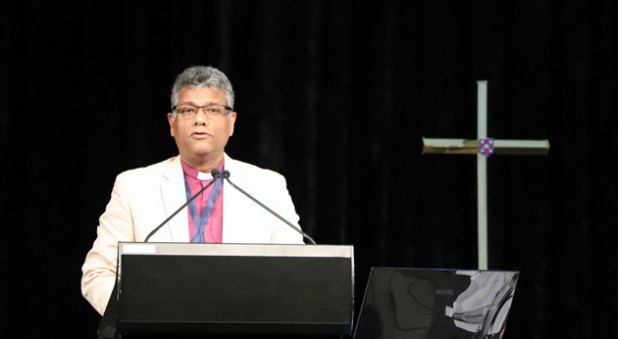Three votes in the House of Bishops prevented General Synod from passing a motion expressing support for marriage according to Scripture. The statement was blocked despite indications it had strong backing in Synod generally.
The motion was in response to an opinion in 2020 by the Appellate Tribunal, a church legal body, that the blessing of same-sex marriages was not inconsistent with the Fundamental Declarations of the Constitution of the Anglican Church of Australia. But it made the point that it was up to General Synod to determine Church practice and to express its view about the blessings of same-sex marriages.
In moving the motion to clarify the situation, Archbishop Kanishka Raffel thanked the Appellate Tribunal for its work and noted that in its report, it said “we are not expressing any opinion as to whether marriage between persons of the same sex is consistent with or contrary to the Scriptures”.
"Jesus teaches that marriage is a lifelong, mutual and exclusive commitment between a man and a woman," the Archbishop said, quoting Matthew 19. "For Christians, these words of Jesus are authoritative, trustworthy and good, and involve the implication that God’s gift of sexual intimacy is part of the lifelong, covenantal relationship of marriage."
"Sexual differentiation is essential for marriage, and therefore same-sex marriages do not come within a Christian understanding of marriage."
"Of course, we acknowledge that same-sex marriages under the Marriage Act have both legal validity and their own internal integrity, bringing to those who are party to them meaning, companionship and comfort," he said. "But Christians must continue to say that God has designed human sexuality to be expressed in the context of marriage between a man and woman who have committed themselves to each other exclusively and permanently. Whenever the Bible addresses sexual expression outside of marriage, whether that is heterosexual or homosexual expression, its assessment is negative."
"As I stand here to speak in support of Statement 1, my heart aches with the difficulty of these issues," said the Rev Natalie Rosner who seconded the motion. "I have faces of people I love in my mind. People for whom these questions of Christian faith and human sexuality are very personal. For whom the outcomes of these questions are a daily reality."
"These questions are complicated, challenging, and painful in many ways. We must come to them with deep humility, with a desire to understand and uphold Scripture and under the guidance of the Holy Spirit." she said.
The Bishop of Canberra & Goulburn Mark Short called the statement "not an ending but a beginning". Bishop Short said the work of pastoral accompaniment of the statement would happen when Synod delegates returned to their diocese, which he described as "the work of engaging our diverse world with the love of Jesus. That work of pastoral accompaniment will take place with open bibles and bowed heads." he said.
The Primate Geoffrey Smith said he appreciated the way the debate had been conducted. "We have disagreed well," the Primate said.
Earlier amendments were strongly defeated showing the motion would have had overall support but a move by opponents of the motion to take a vote by houses meant that it narrowly failed to get support in the House of Bishops.
The voting was :
House of Laity 63 yes 47 no
House of Clergy 70 yes 39 no
House of Bishops 10 yes 12 no
Archbishop Raffel later issued a statement:
"I thank God that the Synod discussion of this sensitive personal matter was conducted with deep mutual respect and care. We are conscious that the discussion takes place in some sense ‘in public’, and that there is a risk of some feeling hurt or left out. We rely on, and rest in the sustaining love and grace of Jesus for all,” he said.
"The doctrine of our church has not changed. The previous Synod carried two separate motions affirming the teaching of Jesus on marriage. Today, the majority of the House affirmed the teaching of Jesus on the subject of marriage and its expression in historic Anglican rites. That is why I am deeply disappointed that a majority of Bishops voted against making a clear statement. A valuable moment for clarity has been lost."






















